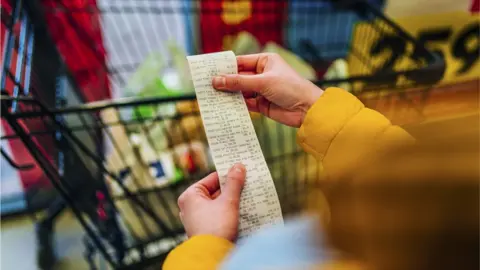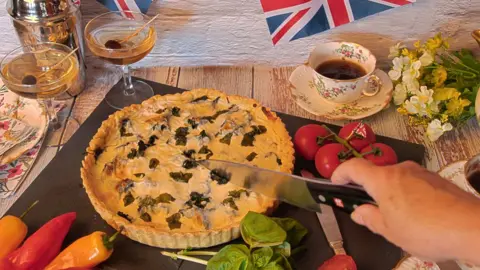Food price inflation dips for second month in a row
 Getty Images
Getty ImagesThe rate at which food prices are rising fell for the second month in a row in May but remains "incredibly high", says research firm Kantar.
Prices were up by 17.2% from a year ago in the four weeks to the middle of May, down from 17.3% last month, it said.
Food price rises are expected to ease further later this year, but Kantar said an average annual grocery bill is now up to £833 higher than a year ago.
Despite the pressures shoppers still stocked up for the Coronation in May.
Sales of wine, fresh cream and pastry all soared as people "got into the spirit" of the occasion and had a go at making the official Coronation quiche, Kantar said.
Chancellor Jeremy Hunt met food manufacturers on Tuesday to discuss the cost of food and look for ways to ease the pressure on households. They agreed to keep in contact.
Karen Betts, chief executive of industry group the Food and Drink Federation, said manufacturers had been absorbing costs, but price rises had been "unavoidable" due to rising prices for ingredients, energy and labour.
Inflation is the rate at which prices are rising. A drop in inflation does not mean prices are falling, but just that the rate of increases is slowing.
Food price inflation is still at a near-record high. Nevertheless, May's slight fall was "without doubt welcome news for shoppers", according to Fraser McKevitt, Kantar's head of retail and consumer insight.
He added that households were finding "different ways" to shop and save money, including by opting for supermarkets' own-brand equivalents. Supermarkets are also battling to offer value to shoppers to lure them through their doors.
"In the fierce contest for market share, eyes have been on the dairy aisle in particular, where the average cost of four pints of milk has come down by eight pence since last month," Mr McKevitt said.
"Prices are still much higher than they were 12 months ago, at £1.60 currently versus £1.30 last year, but retailers know just how important it is to offer even small savings on staple products like milk to get customers through the door."
In April, Aldi, Lidl and Asda joined rival supermarkets Sainsbury's and Tesco in cutting the price of milk.
 Getty Images
Getty ImagesDespite the price pressures, people made the most of the extra bank holiday this month, Kantar's research suggests, with an extra £218m passing through tills during the week of the Coronation.
Sparkling and still wine proved popular, with sales rising by 129% and 33% respectively.
People also stocked up on ingredients to make the official Coronation quiche with sales of chilled pastry soaring by 89%, while fresh cream sales were up by 80% and frozen broad beans by 57%.
"We'll have to wait and see whether it becomes as much loved as its 1953 counterpart Coronation chicken and cements its place on the British picnic and garden party menu," Mr McKevitt said.
Rising food prices are helping to fuel stubbornly high inflation, which hit 10.1% in the year to March. The latest official figures on Wednesday are expected to show inflation fell during April.
Food prices have surged in the last year after soaring energy prices drove up the cost of production and supply chains were disrupted.
Wholesale prices have been falling, but there is a time lag before that feeds through to prices on supermarket shelves.
However, food retailers and producers have faced claims they are profiteering from rising prices, after a drop in the cost of wholesale food prices globally did not lead to falls in the prices charged by UK supermarkets.
Patrick Coveney, chief executive of catering group SSP, which owns Upper Crust and Millie's Cookies, told the BBC's Today programme he hoped inflation would ease this year.
"My hope would be that as the very, very high levels of inflation that we've had begin to ease, you'll begin to see that being reflected in reduced levels of price increases and perhaps even price deflation later in the year."
However, after the International Monetary Fund gave its latest forecast for the UK economy, the organisation's managing director Kristalina Georgieva told the BBC: "What is most concerning is food prices."
Last week, the prime minister held a food summit at Downing Street, and on Tuesday, the chancellor will meet food manufacturers to discuss the persistently high prices.


How can I save money on my food shop?
- Look at your cupboards so you know what you have already
- Head to the reduced section first to see if it has anything you need
- Buy things close to their sell-by-date which will be cheaper and use your freezer

